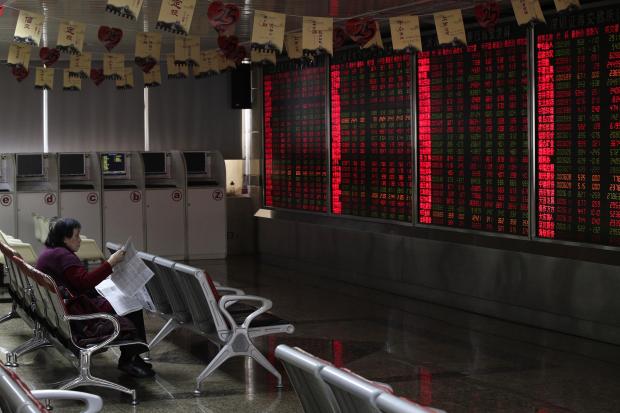China shares lifted by stimulus hopes, optimism on trade

In this Jan. 18, 2019, file photo, a woman reads a newspaper at a brokerage house in Beijing. Shares rose in Shanghai and Hong Kong on Monday, Jan. 21, 2019, as China reported that its growth fell to a three-decade low of 6.6 percent in 2018. The weaker data released Monday raised hopes for additional moves to shore up support for lagging business activity, though benchmarks fell back slightly from stronger gains just after markets opened. (Photo by ANDY WONG / AP)
Shares closed moderately higher in Shanghai, Hong Kong and Shenzhen on Monday as a report of weaker economic growth in 2018 raised hopes for more government stimulus.
The report by the National Statistics Bureau said the world’s second largest economy grew at a 6.6 percent annual pace last year, the slowest since 1990, as slowing demand and a trade war with the U.S. bit dragged on business activity.
Still, officials said there was room for policies to counter the slowdown.
“The trade dispute has not and will not change China’s economic growth fundamentals. The Chinese economy’s resilience and ability to resist shocks and the long-term trend of stability has not and will not change,” Ning Jizhe, commissioner of the National Bureau of Statistics, told reporters in Beijing.
The Shanghai Composite index surged on the open and closed 0.6 percent higher at 2,610.51, while Hong Kong’s Hang Seng rose 0.4 percent to 27,196.54. The Shenzhen A-shares index added 0.6 percent to 1,390.84.
Expectations that the government might step up spending on construction and loosen controls on lending helped push steel mills, property and energy companies higher.
China Shenhua Energy Co. rose 2.8 percent on Monday, while Baoshan Iron & Steel Co. added 2.0 percent.
“The details show that the infrastructure investment is shaping up to be the engine for 2019. However, non-infrastructure business activities will be dismal this year. And debt will grow,” Iris Pang of ING Economics said in a commentary.
Much depends on the progress of trade talks with the U.S. If the two sides were to ease tariffs imposed on each other’s exports, less stimulus would be needed, Pang said.
Top trade envoys from both countries are due to meet at the end of January.
The U.S. trade deficit with China grew to a record $323.3 billion in 2018. The two countries have raised taxes on billions of dollars of each other’s goods in the spat over the trade deficit, Beijing’s manufacturing plans, and U.S. complaints that China steals technology from foreign companies. /atm